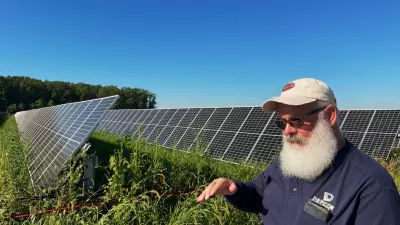Democrats won the White House in 2020 and the Democratic Party proved many pundits wrong in the 2022 midterms — elections that generally don’t favor the president’s party. But as the 2024 general election looms, it still faces an uphill battle to win in predominantly white, blue-collar counties once considered Democratic bastions, a new report states.

“There are overall national trends that make it harder for Democrats to win in non-metro America, and that is a problem we have to solve,” said Mike Lux, a Democratic political consultant and board chair of American Family Voices, a nonprofit based in Washington, D.C., which issued the report.
It focuses on voters in so-called “Factory Town” counties in six key states: Pennsylvania, Ohio, Michigan, Iowa, Wisconsin, and Minnesota. The report is based in part on surveys conducted by Lake Research Partners with 600 likely voters in 24 counties.
With the exception of Minnesota, Donald Trump won the remaining five in 2016, breaking down the “Blue Wall” leading to Democratic nominee Hillary Clinton’s loss.
Although Democrat Joe Biden won back Pennsylvania, Michigan and Wisconsin in 2020, all six states remain tough for his party and will be among the most highly competitive counties in 2024, said Lux, also founder of American Family Voices.
“It’s a problem we have to solve as a party,” he said, adding there is good news for the Democrats. They retained the governorship in Michigan and took control of that swing state’s legislature for the first time in four decades.
In Pennsylvania, another crucial swing state, the Democrats won an important U.S. Senate race with Democrat John Fetterman defeating Republican Dr. Mehmet Oz, won the governorship with Josh Shapiro beating Trump-aligned state Sen. Doug Mastriano by almost 15 points. Dems also hold a majority, albeit by one seat, in the state House for the first time in a dozen years.
Democrats won these races because “the messaging worked … but it’s not like the party’s problems are solved,” Lux said. “We want Democrats to get elected. With a combination of early organizing efforts and a strong populist message, we can do very well.”
Trump, too, won in 2016 with a populist message, but “has a very right-wing, nationalist version of populism,” Lux said. “He also ran to the left of traditional Democratic and Republican views on trade, and that helped him. His anti-establishment message also helped him.”
Lux’s advice to Democrats: “Our populism needs to be about economic issues and fighting big companies that are abusing and exploiting workers and consumers. That kind of message is very powerful.”
Terry Madonna, senior fellow for political affairs at Millersville University in Pennsylvania, agreed.
He said many blue-collar Democrats, who tend to be culturally more conservative, walked away from the party years ago because of its liberal views on such issues as abortion and LGBTQ rights.
While Democrats have lost rural voters, they have made great strides in gaining support in the ever-expanding suburbs, he said.
To gain support of more “blue-collar, working-class voters,” Madonna said, “Democrats have to be careful how to frame (cultural) issues and have to go and talk about things that will create jobs for those people.”
He pointed to Pennsylvania Gov. Shapiro’s first executive order after taking office as a good example.
Shapiro eliminated the four-year college degree requirement for 92 percent of state government jobs — about 65,000 positions. This allows people seeking state government jobs to get hired more easily if they have work experience, instead of a college degree.
“It’s about what to do to help people find jobs. That would be one very important step Democrats could make,” Madonna said.
President Biden, a native of Scranton, Pennsylvania, who was first elected as a U.S. Senator from Delaware in 1972, also appeals to many blue-collar workers, he added.
“He spent a good amount of time in Pennsylvania campaigning for Democrats and would routinely start out his talks that he lived there and point out that he was coming home.”
“Biden is a lot more appealing a person than some Democrats have been in the past,” Lux said. “It’s not that he’s appealing because he’s from Scranton; it’s just that his agenda really helps people.”
Lux said the infrastructure bill and capping the cost of insulin to $35 a month for people with diabetes are “going to be huge in these counties. Biden’s agenda is a very big part of the Democratic strategy in 2024” and the party should not shy away from touting it.
“We have to do a better job of educating the people about the real gains Biden has made being pro-labor. His administration has done more for working people than any president since (Franklin Roosevelt),” Lux said.
But if Democrats are to make gains in these “Factory Towns,” they need to do a better job organizing at the grassroots level, Lux said.
“We can’t get any credibility or traction as either Democrats or on any issue if we parachute in only a couple of months before the election,” he said. “These are folks who are cynical and they think candidates don’t care about them. We need to get into the local communities, we need to go door-to-door, organize community events and re-establish the bonds of community. Those are the strategies that are going to bring these counties back for progressives or Democrats.”







